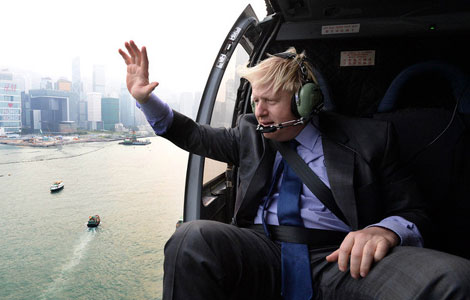Seizing the strategic initiative
Updated: 2013-10-21 07:11
By Chen Xiangyang (China Daily)
|
|||||||||||
To ensure sustainable and healthy development of the Asia-Pacific economy, Xi stressed that APEC should play a leading role in maintaining and advancing an open-world economy and put forward a three-point proposal to this end: strengthen macroeconomic policy coordination and jointly promote Asia-Pacific common development; maintain economic and financial stability in the Asia-Pacific region through factual assessment of the situation and cool-headed responses to challenges; and take a long-term perspective and encourage members to deepen economic restructuring to inject more vitality into sustainable development of the Asia-Pacific region.
In consideration of the multiple economic cooperative arrangements and mechanisms in the Asia-Pacific region, Xi stressed that the relevant arrangements should learn from each other, promote each other, integrate with each other, and complement each other. Also, countries should join forces to promote Asia-Pacific economic integration, be committed to open development, and firmly oppose trade protectionism and have firm confidence, injecting new vitality to the multilateral trading system.
Xi also put forward proposals for boosting connectivity in the Asia-Pacific region, such as building a connectivity landscape connecting and covering both shores across the Pacific, breaking the bottlenecks hindering connectivity, expediting connectivity and infrastructure development within the framework of regional and international cooperation, and enabling the people in the Asia-Pacific to forge closer ties through connectivity.
Li's visit to Southeast Asia and attendance at the East Asia leaders' meetings also produced a series of highlights. The visit further promoted political mutual trust and mutually beneficial cooperation between China and ASEAN. While attending the 16th China-ASEAN Summit, Li proposed a 2+7 (two political consensus and seven cooperation fields) cooperation framework, which represents the new Chinese leadership's new vision on expanding the China-ASEAN relationship.
China and ASEAN should further deepen two political consensuses: the foundation of advancing cooperation lies in deepening political mutual trust and enhancing good-neighborly friendship; and the key to deepening cooperation is focusing on economic growth and expanding mutual benefits. Li suggested the two sides carry out deep, high-level and all-around cooperation in seven fields in the next 10 years: actively discuss the signing of a treaty on good-neighborliness, friendship and cooperation; start negotiations on upgrading the China-ASEAN Free Trade Area; strengthen exchange and cooperation in the security field; push forward connectivity; strengthen financial cooperation of this region to guard against risks; steadily advance maritime cooperation to build the "maritime Silk Road" of the 21st century; and boost exchanges in people-to-people and cultural fields, science and technology and environmental protection.
Facing up to the South China Sea disputes, Li took the initiative to commit himself to defusing contradictions and maintaining peace and stability in the South China Sea. Li stressed that the disputes should be resolved peacefully between the disputing countries and, before a peaceful solution is reached, disputing countries should actively promote joint development. China is ready to continue to work with other countries in the region to uphold free and safe navigation in the South China Sea. Li said the Declaration on the Conduct of Parties in the South China Sea (DOC) constitutes the cornerstone for peace and stability in the South China Sea, and China will continue to consult with ASEAN countries on formulating the Code of Conduct in the South China Sea (COC) under the framework of implementing the DOC. China and Vietnam have agreed to create a joint marine working group to promote joint development on the sea.
Moreover, the promotion of China's high-speed railways technology in Southeast Asia will help build regional connectivity. While addressing the Thai Parliament, Li said that railway cooperation can become a new highlight of China-Thailand cooperation. China is a leader in high-speed rail construction and has rich managerial expertise, and there is enormous potential for railway cooperation between the two countries.
The Chinese leadership's closely linked Southeast Asia tour and ideal debut in two major regional summits complemented each other, which not only fully demonstrated Beijing's confident, forward-looking and innovative diplomatic approaches in the new era, but also indicated that China is doing well in managing its grand neighboring strategy.
The author is deputy director of World Politics Research Institute, affiliated to the China Institutes of Contemporary International Relations.
(China Daily 10/21/2013 page8)
Related Stories
China on track to rail link with neighbors 2013-10-13 08:21
Li plans to seek deeper trust with neighbors 2013-10-09 07:20
China aims for mutually-beneficial ties with neighbors 2013-10-06 19:20
Xi confident of boost to China-ASEAN ties 2013-10-06 22:57
Shaping the future of sustainable energy in Asia-Pacific 2013-10-16 21:32
Highlights: Premier Li Keqiang at East Asia Leaders meetings 2013-10-12 11:22
Today's Top News
Beijing works to spur global development
Scientists requested government to plant GM crops
Travelers to Europe bypass attractions of Brussels
China is reaching its tipping point
Li urges greater effort on reforms
'Constructive ideas' on thorny issues needed
US deal key to nabbing fugitives
JPMorgan, DOJ reaches $13b deal
Hot Topics
Lunar probe , China growth forecasts, Emission rules get tougher, China seen through 'colored lens', International board,
Editor's Picks

|

|

|

|

|

|





